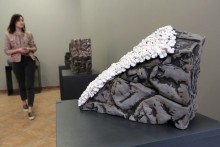The Zelena Kanapa Gallery is hosting an exhibition of the famous ceramic artist Olha Pylnyk, entitled “Fossils 4018.” The number in the title of the exhibition is a notional year, into which the artist tries to transport visitors of the exhibition with her works, and the gallery serves in this case as a museum of archaeology of the future.
“Once, while going on a walk, I began to look at the roadsides not yet covered with grass. They were littered with pressed plastic bottles that looked like they were lying there for centuries. Then I wondered, ‘how will we look in the next civilizations’ imaginations? And what will we leave for their future archaeological excavations?’ Foreseeing that correctly is probably very difficult, and this is not my task. Let the futurologists think about it. I only have a great hope that subsequent civilizations will be even more sapiens,” Pylnyk said.
And so the project “Fossils 4018” came to be. The ceramic artist and her son began to travel to the suburbs of Lviv to collect plastic waste there. However, before disposing of it, she impressed it on her ceramics. In that way, strange fossils of the future appeared on her works which are made of chamotte, or fired clay.
“Such bottles cover our whole planet. They are everywhere: in cities and villages, on land and in water bodies, in woods and fields, in the mountains and plains, on all continents. In my imagination, I already saw how the archaeologists of subsequent civilizations would find the whole piles of compressed bottles that had already fossilized or left impressions on the stone. I wanted to show this in my works and express this incredibly striking contrast between the natural beauty of the land and the sad anti-aesthetics of man-made garbage of our time,” said the artist.
In total, 11 works ranging from 30 to 70 centimeters in length are presented at the exhibition. All of them are also covered with angobs and enamels.
According to the gallery’s owner Olesia Domaradzka, this project is a good example of contemporary art, and is full of profound meanings as well. After all, it raises the issue of plastic bottles and plastic waste in general, which harms our planet.
“Fossils 4018” can be visited until May 6.







